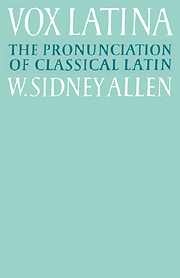Summary
As length is a property of vowels, quantity is a property of syllables; and although there are connexions between length and quantity in Latin, the two properties are to be clearly distinguished.
When a syllable contains a long vowel, it is automatically ‘heavy’, e.g. the first syllables of pōtus, pāctus. But when it contains a short vowel, its quantity depends upon the nature of the syllable-ending; if it ends with the vowel, the syllable is ‘light’, e.g. the first syllable of pě-cus; if it ends with a consonant, the syllable is heavy, e.g. the first syllable of pěc-tus. In order to determine whether a syllable ends in a vowel (‘open’ syllable) or a consonant (‘closed’ syllable) in Latin, it is necessary to apply the following rules:
(1) Of two or more successive consonants, at least the first belongs to the preceding syllable (i.e. the preceding syllable is closed, as in pěc-tus, pāc-tus); this rule also applies, of course, to double consonants (e.g. ǎn-nus).
(2) Asingle consonant between vowels belongs to the following syllable (i.e. the preceding syllable is open, as in pě-cus, pō-tus).
These rules do not necessarily mean that the division between syllables takes place at exactly these points, but they are adequate for all practical purposes.
There is one exception to rule (1) above. If a plosive consonant (p, t, c, b, d, g) is followed by a liquid (r, l), either the group may be divided, like any other group, between the preceding and following syllables (thus, for example, pǎt-ris, giving a heavy first syllable), or it may go as a whole with the following syllable (thus pǎ-tris, giving a light first syllable).
- Type
- Chapter
- Information
- Vox LatinaA Guide to the Pronunciation of Classical Latin, pp. 89 - 94Publisher: Cambridge University PressPrint publication year: 1978



